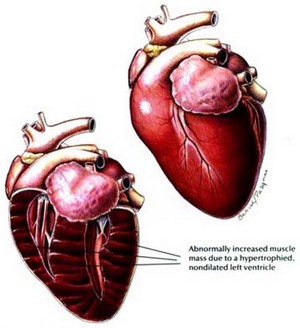


Heart Disease In Cats: Symptoms And Treatments
Hypertrophic Cardiomyopathy (HCM) In Cats:
HCM is the most common form of heart disease in cats, and it affects young to middle aged cats. It is often undetectable. Heart disease is usually discovered during a routine annual health checkup. Your vet may hear a faster heart rate and perhaps congestion sounds in the lungs. The pulse feels weak.
If left undiagnosed, the most common indication of HCM is pain, associated with blood clot formation in the aorta. Treatment: Heart failure in cats is treated with diuretics, such as furosemide, diltiazem, and nitroglycerine ointment. ACE inhibitors, used in canine and human heart disease, can be beneficial. Some cats respond to essential fatty acid (EFA) supplements and the antioxidants selenium and vitamin E. Ask your vet.
HCM is the most common form of heart disease in cats, and it affects young to middle aged cats. It is often undetectable. Heart disease is usually discovered during a routine annual health checkup. Your vet may hear a faster heart rate and perhaps congestion sounds in the lungs. The pulse feels weak.
If left undiagnosed, the most common indication of HCM is pain, associated with blood clot formation in the aorta. Treatment: Heart failure in cats is treated with diuretics, such as furosemide, diltiazem, and nitroglycerine ointment. ACE inhibitors, used in canine and human heart disease, can be beneficial. Some cats respond to essential fatty acid (EFA) supplements and the antioxidants selenium and vitamin E. Ask your vet.
Blood Clots In Cats:
Thromboembolism, a blood clot in the aorta, where the latter divides into the femoral arteries taking blood to the hind legs, is a painful sign of heart failure. Affected cats cry out and cannot use their hindlimbs, which are cool to the touch. The prognosis is poor.
A condition called disseminated intravascular coagulation (DIC) causes small blood clots in the body. It is most likely triggered by a disease, such as feline infectious peritonitis. DIC is more common in cats than once thought. Treatment: DIC is treated by finding and, if possible, eliminating the cause.
Thromboembolism, a blood clot in the aorta, where the latter divides into the femoral arteries taking blood to the hind legs, is a painful sign of heart failure. Affected cats cry out and cannot use their hindlimbs, which are cool to the touch. The prognosis is poor.
A condition called disseminated intravascular coagulation (DIC) causes small blood clots in the body. It is most likely triggered by a disease, such as feline infectious peritonitis. DIC is more common in cats than once thought. Treatment: DIC is treated by finding and, if possible, eliminating the cause.
The most common form of heart disease in cats causes a thickening (hypertrophy) of the bottom of the heart, the ventricles. This occurs more frequently in Persians, Maine Coons, and domestic shorthairs. The most common cause of blood-clotting failure is eating a rodent killed with an anticoagulant rodenticide.
Above: Hypertrophic Cardiomyopathy Is The Most Common Form Of Heart Disease In Cats.
Thyroid And Heart Disease In Cats:
An overactive thyroid gland increases your cat's heart rate and output. Eventually, the heart's chambers dilate and the blood pressure increases. Any cat with an overactive thyroid should be suspected of having heart disease. Treatment: The whole cat, not just the hyperthyroid state, is treated. Depending on the cat, one or both thyroid glands may be surgically removed. Alternative, drugs are used to suppress excess hormone production. Radioiodine is also effective. Its use involves hospitalizing your cat in the a safe environment for a period of time.
An overactive thyroid gland increases your cat's heart rate and output. Eventually, the heart's chambers dilate and the blood pressure increases. Any cat with an overactive thyroid should be suspected of having heart disease. Treatment: The whole cat, not just the hyperthyroid state, is treated. Depending on the cat, one or both thyroid glands may be surgically removed. Alternative, drugs are used to suppress excess hormone production. Radioiodine is also effective. Its use involves hospitalizing your cat in the a safe environment for a period of time.
Important! Taurine Is Essential For Your Cat's Heart Health:
Cats do not naturally produce enough of this crystalline compound for their needs. Low Taurine levels can lead to dilated cardiomyopathy, a form of heart disease. Always feed your cat good quality cat food that is supplemented with Taurine, rather than dog food or home cooking, which may be lacking.
Cats do not naturally produce enough of this crystalline compound for their needs. Low Taurine levels can lead to dilated cardiomyopathy, a form of heart disease. Always feed your cat good quality cat food that is supplemented with Taurine, rather than dog food or home cooking, which may be lacking.
Also see: Heartworm In Cats
Pet Meds: Dogs | Pet Meds: Cats | Dog Health : By Breed | Cat Health : By Breed | Dog Grooming | Cat Grooming | Pet Top 10's | Pet Food Recipes
Pet Meds: Dogs Pet Meds: Cats Common Dog Health Issues Common Cat Health Issues Dog Grooming Cat Grooming Pet Top 10's
Pet Health:Home
Copyright 2006-2011 PetMedsOnline.Org

Online Store For Cats!
Find everything from basic grooming items and tasty treats, to high tech devices designed for pets!
Find everything from basic grooming items and tasty treats, to high tech devices designed for pets!
Pet Top Lists!
From the friendliest cat breeds to the most intelligent dogs, you'll find it all on our "pet top list" pages!
From the friendliest cat breeds to the most intelligent dogs, you'll find it all on our "pet top list" pages!

